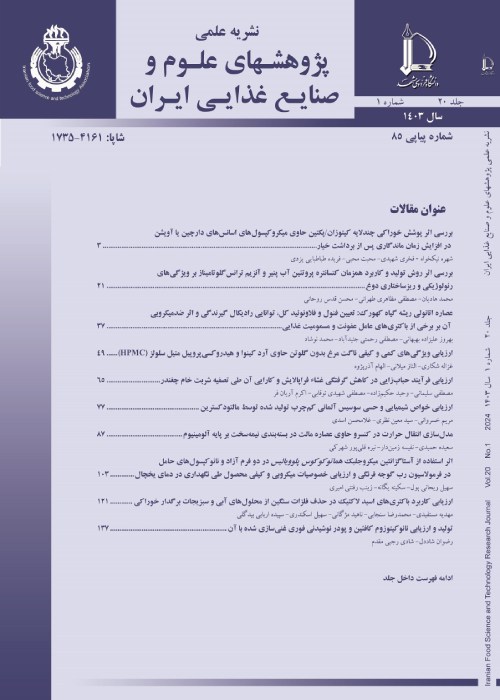Evaluation of antimicrobial Activity of Two Lactobacillus Strains Isolated from Traditional Motal Cheese on shelf life of Yoghurt drink (Doogh)
Author(s):
Article Type:
Research/Original Article (دارای رتبه معتبر)
Abstract:
Introduction
Yoghurt drink or Doogh has gained great attention in recent years in different countries. On the other hand, this desirable commodity has showed some drawbacks especially from microbial point of view. One of the main problems in Doogh production and storage is considered to be the presence and activity of gas producing microorganisms especially in warm conditions and environments. From the consumer point of view, blowing of container is not acceptable and is regarded as a defect. Since lactic acid bacteria (LAB) possess the potential use as adjunct or co-culture in fermented dairy products for inhibition of gas – producing microorganisms’ especially gas-producing yeasts in doogh, inclusion of these bacteria (LAB) can be a solution for this problem in aforementioned product. In this study, antimicrobial effects of two selected strains of Lactobacillus brevis assigned as M2 and M4 isolated from Motal cheese were investigated on the gas-producing and food spoilage microorganisms in Doogh.
Materials and methods
Two strains of lactobacillus namely M2 (Lactobacillus brevis KX572376) and M4 (Lactobacillus brevis KX572378) were selected from traditional Motal cheese isolates. Doogh production was carried out according to National Iranian Standard No. 2453. Each of these two strains was inoculated in Doogh at two levels of 106 and 108 cfu / ml and control sample was taken without inoculation followed by subjecting to microbial and sensory analysis at three temperatures of 4, 25 and 37°C, at intervals of 10, 7 and 7 days, respectively. Microbial profiles including coliforms, E. coli, Mold & yeast and Staphylococcus aureus were determined according to National Iranian Standard Number (2 and 1) –5486, 5234 and 5486, 997 and 6806, respectively. Sensory evaluation was carried out according to Iranian National Standard No. 4691. Sensory evaluation parameters such as taste, texture, color and total acceptance were evaluated by 10 senior food industry students.
Results and discussion
The results showed that sample inoculated with M4106 strain, received the highest score for antimicrobial activity at all three storage temperatures. Results demonstrated that, at 4 ° C, the control sample was contaminated (spoiled) on 50th day and was positive for mold and yeast count, but sample inoculated with M4106 was acceptable (negative) for mold and yeast count. At 25 C, mold growth was detected in control sample on the 14th day of storage, but the sample inoculated with M4106 remained completely un-spoiled until the 21st day. At 37°C, the control sample on day 7 was positive for mold and yeast count, but the sample inoculated with M4106, mold and yeast was not detected until the 14th day. Coliform, Staphylococcus and Escherichia coli counts in M4106 sample were negative. Sensory evaluation was carried out according to Iranian National Standard No. 4691.Sensory evaluation data showed that samples inoculated with M4106 were superior to the control sample. Doogh samples inoculated with Lactobacillus brevis strains experienced acceptable sensory evaluation so that they gained better score than control sample. The highest score was obtained for the M4106 sample. The texture of the Doogh samples showed a decreasing trend at all three temperatures during the storage period. Moisture and pH are factors influencing texture changes during the initial stages of storage. Based on the taste evaluation results, at 4°C, the highest score was related to M4108 until day-20, but from the 20th to the 60th day of storage, the M4106 has gained the highest one. At 25°C until day 7, the highest score belonged to sample M4108 but from this day on, M4106 has been more favorable. At 37°C on production day, highest score for the M4108 sample but on day- 7 and 14, the M4106 took the highest score. Regarding to color index, M2108 has gained the highest score at all 3 temperatures on the production day and for the rest of storage time, the highest scores were obtained for the M4108 and M4106 samples. Maximum total acceptance, was obtained for M2108 on the production day but this was replaced by M4106 for the rest of the time .The results showed that the Lactobacillus strain M4106 strain had the highest antimicrobial activity and the optimum score for sensory evaluation, as well as a significant increase in Doogh shelf life and reduced gas production in the bottle.Keywords:
Language:
Persian
Published:
Iranian Food Science and Technology Research Journal, Volume:14 Issue: 5, 2018
Pages:
829 to 846
magiran.com/p1883342
دانلود و مطالعه متن این مقاله با یکی از روشهای زیر امکان پذیر است:
اشتراک شخصی
با عضویت و پرداخت آنلاین حق اشتراک یکساله به مبلغ 1,390,000ريال میتوانید 70 عنوان مطلب دانلود کنید!
اشتراک سازمانی
به کتابخانه دانشگاه یا محل کار خود پیشنهاد کنید تا اشتراک سازمانی این پایگاه را برای دسترسی نامحدود همه کاربران به متن مطالب تهیه نمایند!
توجه!
- حق عضویت دریافتی صرف حمایت از نشریات عضو و نگهداری، تکمیل و توسعه مگیران میشود.
- پرداخت حق اشتراک و دانلود مقالات اجازه بازنشر آن در سایر رسانههای چاپی و دیجیتال را به کاربر نمیدهد.
In order to view content subscription is required
Personal subscription
Subscribe magiran.com for 70 € euros via PayPal and download 70 articles during a year.
Organization subscription
Please contact us to subscribe your university or library for unlimited access!



